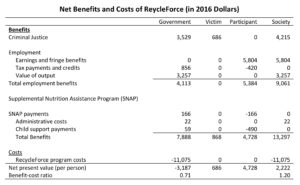Key Findings from Department of Labor’s Enhanced Transitional Jobs Demonstration Benefit Cost Brief (ETJD)

RecycleForce is a social enterprise designed to reduce recidivism while safely recycling electronics in Indianapolis. Through its transitional jobs program, RecycleForce hires formerly incarcerated men and women and provides them job training and support services in preparation for their transition to full-time employment. RecycleForce received funding from the United States Department of Labor (“USDOL”) to operate one of seven programs participating in a Congressionally authorized Enhanced Transitional Jobs Demonstration (“ETJD”), a study to measure the impact of these programs on participants, the government, and local communities.
Background
Every year, almost 600,000 individuals are released from state prisons in the United States; over two-thirds of those released will be

rearrested within three years.
About 4,000-5,000 people return to Marion County from the Indiana Department of Corrections alone. Without intervention, 45% will re-offend and be re-incarcerated within three years.
Recycleforce is the one program identified to have “increased individuals’ employment and earnings and reduced recidivism”, thereby accomplishing the primary goals of the program.
Of the seven communities studied in the Random Control Trial (RCT), RecycleForce outperformed each organization and was the only organization in the study that warranted a cost benefit analysis.
A main factor in the success of the RecycleForce program is its focus on “rapid attachment.”
- This is the number of days between enrollment and the participant’s first paycheck.
- RecycleForce’s unique structure as a social enterprise benefits the participant by minimizing this number resulting in improved outcomes.
Outcomes
Benefits for Individuals and Their Families
The Study found RecycleForce provided considerable benefits to individual Participants and the greater Indianapolis community (the “Community”).
- RecycleForce reduced Participant recidivism by 6.2 percentage points (as is illustrated via the chart).
– Participants were 8.6 percentage points less likely to be incarcerated than the Control Group;
– 4.6 percentage points less likely to be arrested; and – 4.2 percentage points less likely to be convicted. - RecycleForce provided wages to Participants and their families. – Participants earned $5,804 in earnings and other benefits over the 30 month time period associate with the Study.
- RecycleForce wages helped to enable Participants to support themselves and their families.
– Participants paid $490 more in regular child support payments than the Control Group over the time period associated with the Study.
Benefits for the Indianapolis Community
By reducing reoffending among Participants, RecycleForce provided benefits totaling $13,297 per person to the Indianapolis Community.
- RecycleForce provided $4,215 in taxpayer savings over the time period associated with the Study.
- Reduced readmission to prison and jail alone led to savings of $3,565 per Participant.
- RecycleForce prevented members of the Community from being victimized.
– Participation in the RecycleForce program led to $686 in savings per Participant attributable to reduced victimization from crime and associated costs (i.e., medical expenses, lost or damaged property).
Benefits to Government
- RecycleForce reduced Participant recidivism by 6.2 percentage points.
- RecycleForce’s revenue offsets program costs.
– The value of the output of jobs is the largest benefit to the government, as it allows RecycleForce to provide more services than it would otherwise be able to, based solely upon limited government grant funding.
- RecycleForce wages allow Participants to consistently pay taxes.
Program Costs

RecycleForce provides an $11,057 investment in each program participant at a cost of $7,800 after accounting for the $3,257 in revenue generated by each participant.
Download the Executive Summary
Download the ETJD One Year Impacts Report
Conclusion
RecycleForce has successfully reduced recidivism among Participants, increased their pay, and improved their abilities to support their families after leaving incarceration. The Community has also benefited from increased Participant pay; reductions in victimization, reductions in law enforcement costs, reductions in costs associated with judicial administration; and the safe removal of electronic waste. Together, the benefits to the Community amount to $13,2973 per Participant and significantly outweigh the $11,057 cost of the program by roughly $2,200 – or $5,497 after accounting for RecycleForce revenue. State and local governments should be encouraged by these results and their potential for replication on a broader basis throughout the state.

